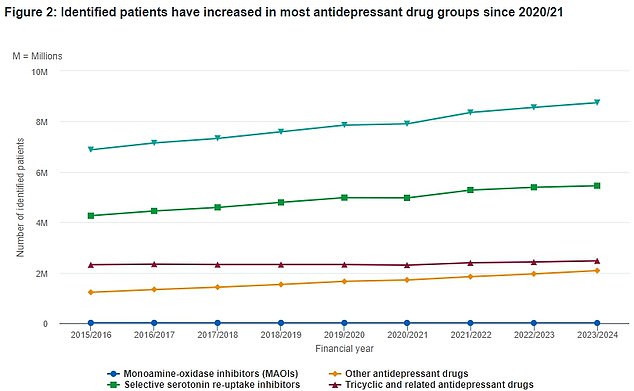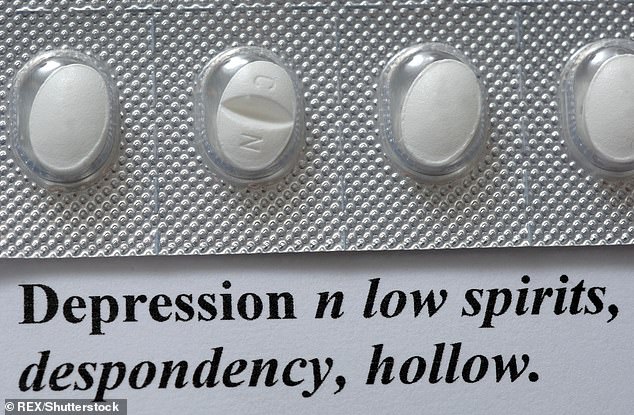One in six people in England are currently taking antidepressants, official NHS data suggests.
Health service figures show a record 8.7 million people in England, about 15 per cent of the total population, are currently taking mood-boosting drugs.
The number of patients for 2023/24 represents a 2.1 per cent increase on last year and a massive 26 per cent rise on the 6.8 million taking the drugs eight years earlier.
However, the data also shows that the proportion of the population taking antidepressants is as high as one in four in some parts of the country.
Women aged 55 to 59 were the largest demographic group using medications, accounting for about one in 20 of the total.
Health service figures show a record 8.7 million people in England, about 15 per cent of the total population, are taking mood-boosting drugs.

This NHS data shows the number of Britons taking each type of antidepressant medication over the past eight years. The line with the green triangles indicates the total number of patients.
They were followed by women aged 50 to 54 years and female patients aged 60 to 64 years.
The vast majority of patients, 5.4 million, were taking a controversial class of antidepressants called selective serotonin reuptake inhibitors (SSRIs).
These drugs, of which Prozac is one of the best known, have raised concerns due to cases of sexual dysfunction among some users, even years after they have stopped taking them.
By NHS region, the North East and North Cumbria was the antidepressant capital of England, with 24.5 per cent of the population taking the drugs.
This was followed by South Yorkshire (23.4 per cent) and Norfolk and Waveney (23.2 per cent).
In contrast, NHS trusts in London recorded the lowest proportion of people taking antidepressants in England.
In north-east London, only one in ten people (11.3 per cent) were taking antidepressants, the lowest percentage in the country.
This was followed by North West London (11.4 per cent) and South West London (12.1 per cent).
Women in their 50s represent the largest demographic of Britons taking antidepressants.
In total, 561,900 women aged 55 to 59 were prescribed these drugs across England in 2023/24.
They were followed by women aged 50 to 54 (547,552) and women aged 60 to 64 (499,099).
A similar pattern emerged among men: men aged 50 to 60 were most likely to be prescribed the drugs, but women accounted for the vast majority of patients (65 percent).
The data also recorded that the NHS prescribed antidepressants to 11,854 under-15s.
Although the vast majority of these (11,186) were children aged 10 to 14, some 600 children aged between five and 10 and 32 children under four were also prescribed the drugs.
NHS data also showed that people in the most deprived areas of England were most likely to be taking antidepressants.
In total, almost 2.2 million people in the poorest areas of the UK took the drugs, 41.3 per cent more than the number of patients in the richest areas.
Selective serotonin reuptake inhibitors (SSRIs) remain the most common class of antidepressant drug in the UK, a position they have held for years.
SSRIs commonly prescribed in the UK include citalopram, fluoxetine and sertraline, sometimes known by the brand names Cipramil, Prozac and Lustral, but researchers have linked their use to long-term and even permanent sexual dysfunction.
The NHS has warned that side effects such as loss of libido and orgasm, lower sperm count and erectile dysfunction “can persist” after taking them, and patients have described feeling “excluded” and having relationships destroyed by their use.
World leaders in the field of psychiatry have previously told MailOnline that “people should think very carefully before approaching them”.
Most doctors and the NHS consider that SSRIs are worth using for depression, particularly in persistent or severe cases, given the debilitating nature of the illness and that patients may, in some cases, attempt self-harm or suicide.

Sertraline has recently been put in the spotlight by singer Lewis Capaldi, who said he struggled to get an erection while taking libido-reducing drugs.

On online forums, some former antidepressant users shared harrowing stories about how the loss of their sex lives, even years after they had stopped taking the medication, had left them feeling suicidal.
The libido-reducing nature of SSRIs came to light last year thanks to Scottish singer Lewis Capaldi.
In a completely nude Netflix documentary, he spoke about taking it to help treat his anxiety and sadly commented on the domino effect it had on his sexual health.
“They’re not really doing anything except I can’t get an erection to save my life,” he said.
The libido-inhibiting effects of SSRIs are so potent that these drugs, including sertraline, have even been tested in the past on sex offenders to help curb their urges.
TikTok users also have They flooded social media with their own stories of how their libido evaporated or how they became emotionally numb while taking medication.
Others shared jokes about how they had to quit, and that the price of having to give up physical pleasure was too high.
However, others who have used these drugs consider them a real lifesaver.
The use of antidepressants has skyrocketed in recent years, despite growing unease among experts about the drugs’ effectiveness in treating depression.
Some studies have even suggested that they may increase the risk of heart problems in young people or even, paradoxically, increase the risk of suicide along with sexual well-being problems.
However, these studies are not conclusive: other experts point out that these trends could be due to patients suffering from the depression that the drugs are designed to relieve, rather than the drug itself.
And many people who take them insist that they work.
People with depression are thought to have low serotonin levels, although there is scientific debate about this, and SSRIs combat this by increasing these levels.
However, some experts suspect that the drugs could be causing an excessive release of serotonin, with consequences for people’s health.
Psychiatrists advise patients concerned about the side effects of antidepressants to talk to their doctor about their options.
Sometimes doctors may offer an alternative dosage, a different medication, or prescribe another medication to combat side effects.
They urge patients who are taking them not to stop taking them without first speaking to the medical professional responsible for their care to ensure they are receiving appropriate support.
The data covers NHS prescriptions for these drugs by the main reason doctors prescribe them.
However, medications such as antidepressants may also be prescribed for other health problems and this would be included in the data.
These include irritable bowel syndrome (IBS) and pain relief. They may also sometimes be prescribed to treat pain.
Therefore, the data cannot be used to measure depression rates across the country.


